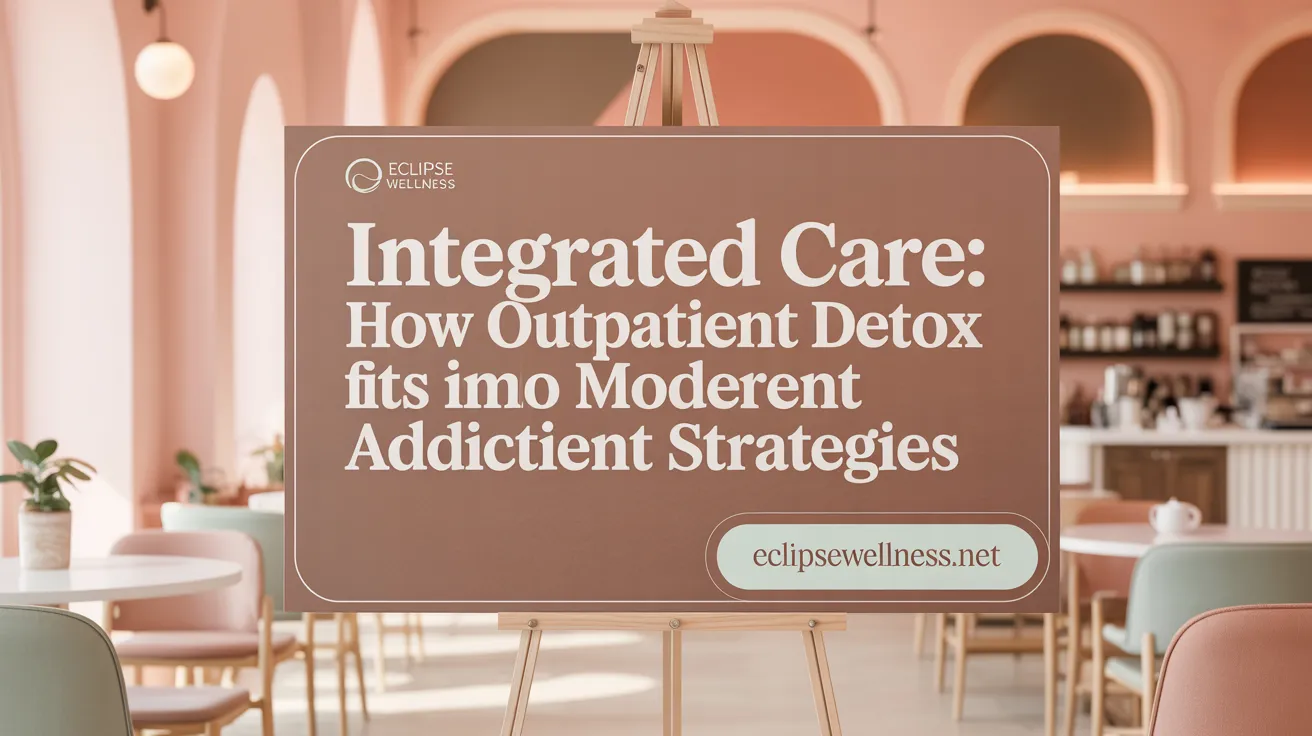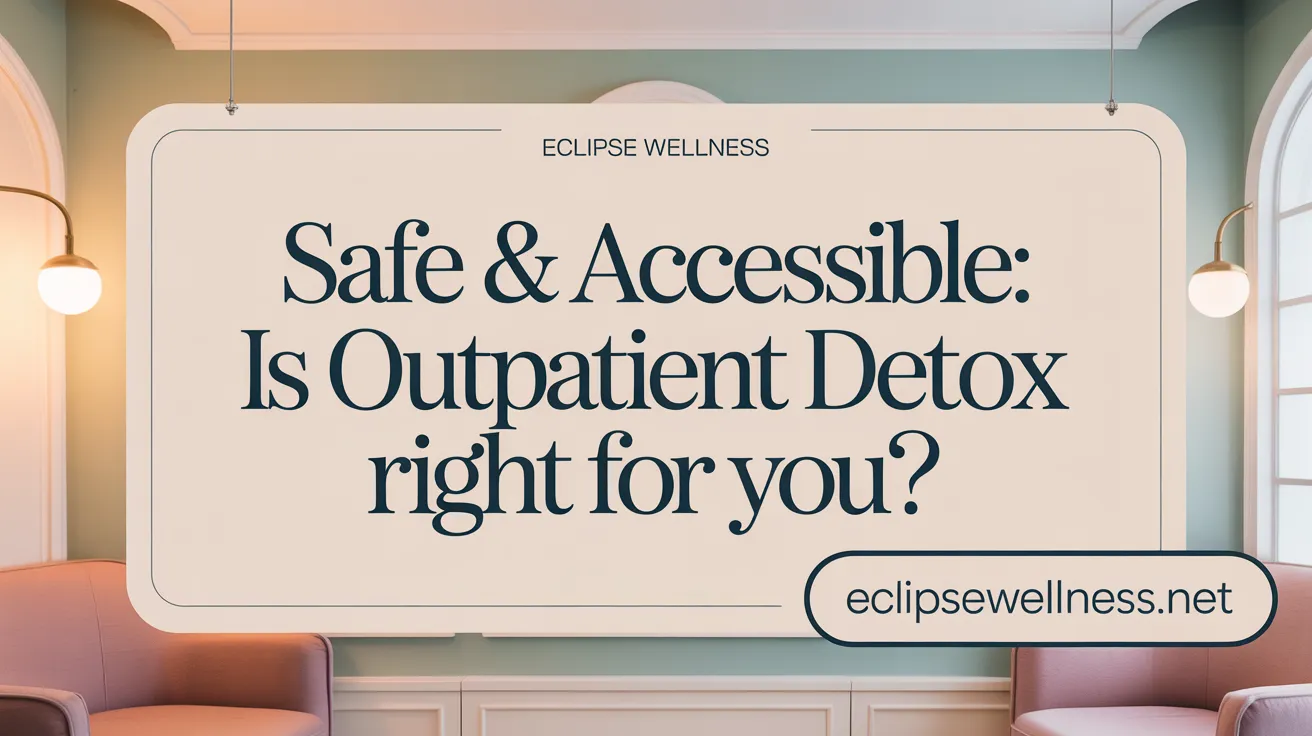Revolutionizing Addiction Care
As substance use disorders continue to challenge public health systems, novel approaches like outpatient detox services have emerged as pivotal advancements in addiction treatment. This article explores why outpatient detox is reshaping recovery paradigms, offering flexibility, accessibility, and comparable effectiveness to traditional inpatient methods, ultimately enhancing patient outcomes and broadening treatment reach.
Understanding Outpatient Detox Programs: Features and Patient Experience

What are the key features and processes involved in outpatient detox programs, and what should patients expect during treatment?
Outpatient detox programs are designed to help individuals safely manage withdrawal symptoms from substances like alcohol and opioids while allowing them to live at home. These programs involve regular medical evaluations, medication management, and counseling sessions, typically occurring daily or several times a week. Learn more about Outpatient Drug and Alcohol Detox.
Patients can expect a structured process that includes initial assessments to determine the severity of dependence, followed by personalized treatment plans. During treatment, medical staff monitor vital signs, adjust medications as needed, and provide education on relapse prevention. Detailed information on Outpatient Detoxification Programs can be found here.
The typical patient journey lasts around 6 to 7 days, with treatment sessions lasting between 15 to 30 minutes each day. The focus is on gradual withdrawal, supported by medications such as buprenorphine or benzodiazepines, administered under professional supervision to reduce withdrawal discomfort and prevent complications. See Alcohol detoxification overview for more on withdrawal management.
Support services are an essential part of outpatient detox, including counseling to address behavioral and psychological aspects of addiction. Patients are also encouraged to participate in support groups, which can reinforce recovery efforts. Read about Therapy for substance abuse.
While outpatient detox offers benefits like lower costs, less disruption to daily life, and the ability to stay connected with support networks, it also has limitations. Risks include the potential for relapse and the possibility that it may not be suitable for individuals with severe withdrawal symptoms or medical conditions requiring more intensive care. For a comparison of safety and outcomes, see Outpatient Detoxification Benefits and Inpatient vs Outpatient Treatment Outcomes.
Post-detox, ongoing treatment such as outpatient therapy or inpatient programs is vital to address underlying social, behavioral, and mental health issues. This comprehensive approach aims to support long-term recovery, reduce relapse risk, and promote sustained sobriety. More about Treatment of Substance Use Disorders.
Advantages of Outpatient Detox: Flexibility, Support, and Personalization

What are the advantages and benefits of choosing outpatient detox services in substance abuse treatment?
Outpatient detox services provide several notable advantages that make them an appealing option for many individuals seeking recovery from substance use disorders. One primary benefit is the flexibility of outpatient detox; patients can continue their daily routines—such as working or attending school—while undergoing treatment. This ability to maintain personal and professional responsibilities helps promote engagement and reduces disruption to their lives.
In addition to flexibility, outpatient detox programs foster a sense of privacy and reduce stigma. Patients can receive care without the need for hospitalization or residential treatment, which can often feel intimidating or shame-inducing. This privacy encourages more individuals to seek help early, preventing escalation of their condition.
Outpatient detox services are highly personalized. They incorporate evidence-based therapies such as cognitive-behavioral therapy (CBT), group therapy, and medication management tailored to individual needs. Many programs also provide support for co-occurring mental health conditions, ensuring a comprehensive approach to recovery.
Support systems are integral to outpatient detox. Patients often involve family members and peer groups, which can enhance emotional support and accountability. Resources like recovery coaching and mutual support groups like Alcoholics Anonymous or Narcotics Anonymous further strengthen ongoing relapse prevention efforts.
Overall, outpatient detox is an effective, person-centered treatment option for those with mild to moderate substance use disorders. It combines professional medical care with personal autonomy, making it a viable choice for many seeking a balanced path to recovery.
Outpatient Detox vs. Inpatient Detox: Effectiveness and Suitability

How does the effectiveness of outpatient detox compare to inpatient detox in substance abuse treatment?
Research indicates that outpatient detoxification can be as effective as inpatient detox for individuals with mild to moderate withdrawal symptoms, especially when medical supervision and support are provided. Short-term studies show higher detox completion and abstinence rates for outpatient programs, while longer-term studies suggest inpatient care may lead to greater reductions in alcohol consumption and higher engagement with support groups like AA.
Inpatient detox offers a controlled, 24/7 medical environment, which is particularly beneficial for severe addictions or co-occurring mental health issues, but it is more costly and intensive.
Outpatient detox is generally preferred for less severe cases, providing greater flexibility, lower costs, and allowing individuals to maintain daily responsibilities.
Ultimately, the choice depends on the individual’s severity of addiction, medical needs, support system, and personal preferences.
Research Evidence Supporting Outpatient Detox Programs

What evidence and research support the use of outpatient detox in substance abuse recovery?
Scientific evidence from systematic reviews and clinical trials strongly supports outpatient detoxification as a safe and effective treatment option for many individuals struggling with substance use disorders. Multiple studies have demonstrated that outpatient programs often achieve higher rates of detox completion compared to inpatient settings, particularly in cases of mild to moderate dependence. Research indicates that, in the short term—typically within the first one to two months—outpatient detox can be as effective, if not more so, than inpatient care in promoting abstinence and reducing substance use.
High-quality randomized controlled trials confirm that intensive outpatient programs (IOPs) produce outcomes comparable to residential or inpatient treatments. These programs utilize evidence-based therapies, such as cognitive-behavioral therapy (CBT), and are designed to support recovery while allowing individuals to remain in their home environment.
Guidelines from reputable health authorities, such as the British Columbia Ministry of Health, endorse outpatient detox because of its proven safety, flexibility, and suitability for most patients. They emphasize that outpatient detox is especially appropriate for those with less severe withdrawal symptoms and stable medical conditions.
Furthermore, outpatient programs excel at addressing co-occurring mental health conditions, integrating behavioral therapies with medication-assisted treatment (MAT) when necessary. This holistic approach enhances long-term recovery prospects. Overall, the accumulated evidence portrays outpatient detox as a cost-effective, patient-centered, and scientifically validated treatment pathway that supports lasting recovery in many cases of substance dependence.
How Outpatient Detox Services Integrate into Modern Addiction Treatment

How do outpatient detox services fit into modern and effective substance abuse treatment strategies?
Outpatient detox services are a cornerstone of contemporary addiction recovery, emphasizing a patient-centered and adaptable approach that aligns well with the overall shift toward community-based care. These services allow individuals with mild to moderate withdrawal symptoms to begin their recovery process safely while continuing daily activities such as work and family commitments (Outpatient Detoxification Programs, Outpatient Detox Benefits, Outpatient Detoxification Guidelines).
Medical supervision is integral to outpatient detox, with healthcare providers carefully monitoring withdrawal symptoms, managing medications like buprenorphine or benzodiazepines, and providing counseling support (Medications for Opioid Use Disorder (MOUD) in FQHCs, Medications in Outpatient Detox, Benzodiazepines for Withdrawal Management). This ensures safety and reduces the risk of complications, making outpatient detox a reliable first step in comprehensive treatment plans (Principles of Effective Treatment for Substance Use Disorders).
Beyond the initial detox phase, outpatient services serve as a gateway for ongoing therapy that addresses the psychological and behavioral facets of addiction. This continuity of care is vital for long-term recovery and relapse prevention (Treatment of Substance Use Disorders, Behavioral Therapy for Addiction, Outpatient substance abuse treatment benefits).
Community involvement plays a significant role, with outpatient programs often incorporating peer support groups, family therapy, and social services—all contributing to a supportive recovery environment (Peer support specialists and community health workers, Family involvement in addiction treatment, Support Groups for Recovery).
Economically, outpatient detox is more cost-effective than inpatient programs, reducing healthcare costs and resource utilization. These advantages are reflected in policy trends, with increasing Medicare and Medicaid coverage, and growing acceptance within the healthcare system (2024 policy developments in SUD treatment, Medicare coverage for outpatient detox services, Cost and Insurance Coverage of Outpatient Services).
In summary, outpatient detox services are effectively integrated into modern treatment strategies by providing accessible, flexible, and holistic care tailored to individual needs, fostering sustained recovery and community reintegration (Outpatient Treatment Programs, Intensive Outpatient Programs (IOP), Comprehensive Approach to Substance Use Treatment).
Safety, Accessibility, and Patient Suitability in Outpatient Detox
 Outpatient detox programs are a vital component of substance use disorder (SUD) treatment, providing a flexible and accessible option for many individuals seeking to safely manage withdrawal symptoms. These programs are generally suitable for patients with mild to moderate withdrawal symptoms who have stable medical and psychiatric conditions. Patients who live in a supportive environment and can adhere to treatment protocols often find outpatient detox an effective pathway to recovery.
Outpatient detox programs are a vital component of substance use disorder (SUD) treatment, providing a flexible and accessible option for many individuals seeking to safely manage withdrawal symptoms. These programs are generally suitable for patients with mild to moderate withdrawal symptoms who have stable medical and psychiatric conditions. Patients who live in a supportive environment and can adhere to treatment protocols often find outpatient detox an effective pathway to recovery.
Careful medical evaluation is essential to determine if a patient is a good candidate for outpatient detox. This assessment considers the severity of dependence, potential for severe withdrawal complications, and the patient’s overall stability. For example, individuals with severe alcohol dependence or those at risk for life-threatening withdrawal symptoms such as seizures or delirium tremens are usually better served with inpatient or residential care (Alcohol detoxification overview, Outpatient Detoxification Programs).
The benefits of outpatient detox include its lower cost, convenience, and ability to allow patients to continue their daily routines such as work or family responsibilities (Benefits of outpatient treatment, Outpatient Detox Benefits). It also promotes increased autonomy and comfort, especially when combined with medications like buprenorphine or benzodiazepines administered under medical supervision (Medications for opioid use disorder, Benzodiazepines for withdrawal management).
However, outpatient detox carries inherent risks, particularly for patients prone to relapse or with complex medical histories. The absence of continuous medical supervision means that any deterioration in health or sudden escalation of withdrawal symptoms may go unnoticed without vigilant follow-up (Safety protocols for withdrawal management). Therefore, ensuring robust support systems—including family involvement, regular check-ins, and access to emergency care—is crucial for patient safety (Family involvement in addiction treatment, Support systems in outpatient care).
In some cases, outpatient detox may not be appropriate. Patients with a history of severe withdrawal, comorbid mental health disorders, or unstable living conditions should be considered for inpatient treatment (Inpatient Rehab, Inpatient vs Outpatient Rehab). The importance of individualized treatment planning cannot be overstated, as it maximizes safety and promotes better health outcomes (Principles of Effective Treatment for Substance Use Disorders).
In sum, outpatient detox programs are generally safe and accessible when patients are appropriately selected based on thorough medical and social assessments. They can effectively support recovery in suitable patients, especially when integrated into a comprehensive treatment plan that includes ongoing support and follow-up care (Outpatient care for substance use disorder, Outpatient Drug and Alcohol Detox).
Outpatient Detox’s Role in Enhancing Recovery Outcomes

How do outpatient detox programs enhance recovery outcomes compared to traditional methods?
Outpatient detox programs, including intensive outpatient programs (IOPs), improve recovery results by offering structured, evidence-based therapy in community-based settings, which allow patients to maintain daily routines and social connections. These programs generally involve a minimum of 9 hours of treatment per week, incorporating individual, group, and family therapy sessions. This flexible approach supports ongoing engagement with support networks while effectively managing co-occurring mental health issues.
Research indicates that outpatient programs are just as effective as inpatient care in reducing substance use and problem severity, especially for individuals with mild to moderate conditions. High retention and treatment adherence rates have been observed, partly because patients can continue working, attending school, and living at home. For more on this, see summaries on Outpatient Detoxification Programs and Treatment Outcomes and Outpatient Detoxification Benefits.
The use of therapies like cognitive-behavioral therapy (CBT) and dialectical behavior therapy (DBT) within outpatient settings helps individuals apply coping skills practically in everyday life, which is essential for relapse prevention.
This holistic approach promotes long-term abstinence, emotional stability, and social functioning, making outpatient detox a personalized and accessible alternative to traditional inpatient methods. Overall, outpatient programs support sustained recovery by emphasizing real-world application of skills, ongoing social support, and treatment flexibility. More information on outpatient program benefits can be found at Benefits of Outpatient Treatment and Outpatient Addiction Treatment Advantages.
Cost-Effectiveness and Practical Benefits of Outpatient Detox

Lower treatment costs compared to inpatient care
Outpatient detoxification is generally more affordable than inpatient programs. Since patients do not need to stay overnight in a facility, expenses associated with room and board are eliminated. This makes outpatient services a financially accessible option for many individuals, especially when insurance coverage is considered.
Insurance coverage expansion and support
Recent policy changes have broadened insurance support for outpatient detox services. Medicare, Medicaid, and private insurers now routinely cover outpatient treatments, including telehealth options, which increase accessibility. These expansions reduce out-of-pocket costs and encourage more individuals to seek help.
Minimal disruption to work and family life
Outpatient detox allows patients to maintain their daily routines, such as working and caring for family members. Patients attend scheduled treatment sessions during the day and return home at night, ensuring ongoing responsibilities are not neglected. This flexibility is especially valuable for individuals with commitments that cannot be deferred, aligning with benefits of outpatient treatment.
Enhanced patient autonomy and privacy
Choosing outpatient detox supports personal independence, enabling patients to stay in familiar environments while undergoing treatment. It also offers a higher level of privacy, as patients do not need to disclose their treatment in a residential setting, reducing stigma and promoting comfort. This is consistent with the advantages of outpatient rehab privacy.
Broader access due to policy changes and telehealth
Innovations like telehealth have made outpatient detox more accessible, especially in rural or underserved areas. Policy reforms supporting telemedicine services mean patients can receive professional care remotely, breaking geographical barriers and ensuring timely intervention, as highlighted in SUD telehealth services and outpatient detox telehealth.
| Aspect | Benefits | Additional Details |
|---|---|---|
| Cost | Lower expenses due to no inpatient lodging | Insurance coverage widely expanded, including Medicare and Medicaid |
| Flexibility | Continue work and family duties | Shorter treatment durations, often 6-10 days (Outpatient detoxification process) |
| Privacy | Stay at home, maintain discretion | Reduced stigma around treatment (Privacy in outpatient care) |
| Access | Telehealth enables remote care | Especially beneficial in rural areas (Expanded SUD treatment coverage options) |
These advantages show that outpatient detox is both practical and economically sensible, supporting effective recovery in a convenient, patient-centered manner.
Embracing Outpatient Detox for a New Era of Recovery
Outpatient detox services represent a transformative advancement in substance abuse treatment, combining clinical efficacy with flexibility, accessibility, and personalization that meets patients where they are. Supported by robust research and integrated within modern addiction treatment frameworks, outpatient detox offers a safe and effective alternative for many individuals, particularly those with mild to moderate withdrawal symptoms. Its ability to reduce costs, maintain patient autonomy, and enhance engagement with real-world social supports makes it a vital component in addressing the growing challenges of substance use disorders. As healthcare systems continue to evolve with supportive policies and expanded coverage, outpatient detox stands as a game changer—empowering more people to embark on lasting recovery journeys with dignity and hope.
